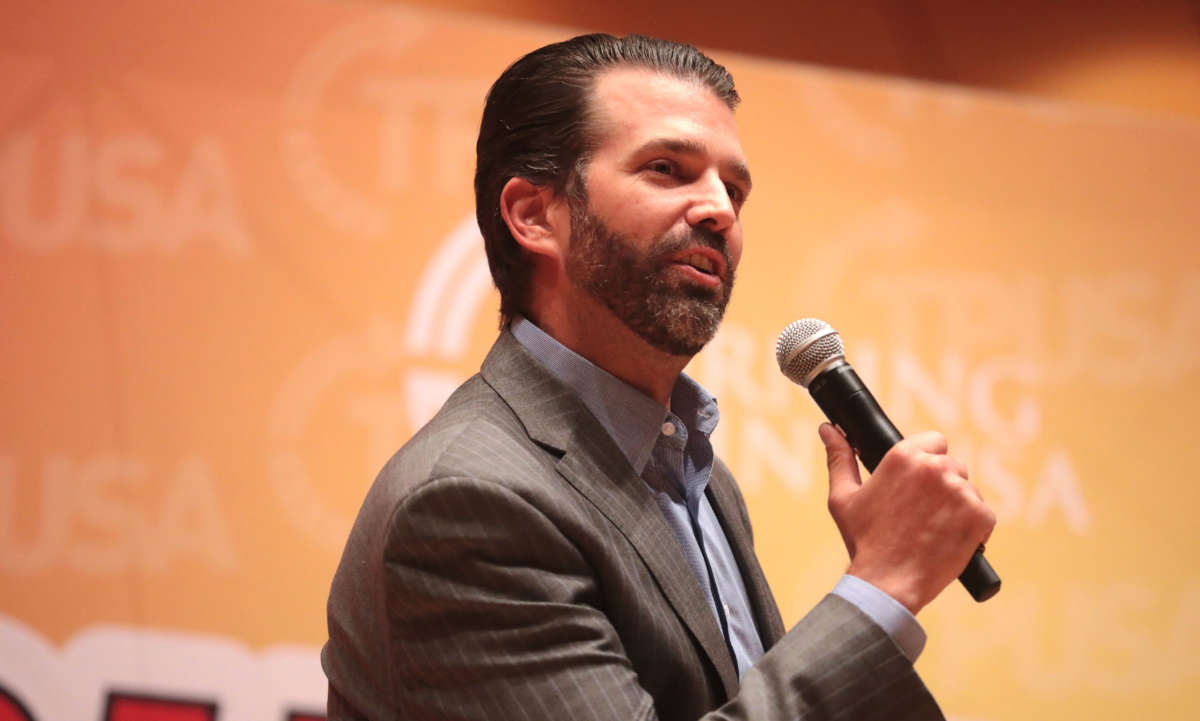Support justice-driven, accurate and transparent news — make a quick donation to Truthout today!
Donald Trump Jr., the eldest child of President Donald Trump, has received a suspension from the social media site Twitter for sharing potentially harmful information related to coronavirus.
Don Jr. shared “misleading and potentially harmful information” about coronavirus, resulting in his suspension on Tuesday morning, the social media site explained.
“The Tweet is in violation of our COVID-19 misinformation policy,” a spokesperson for Twitter said. “The account will be locked until the account owner removes the Tweet.”
Twitter announced in March that it would regulate and remove content “when it has a clear call to action that could directly pose a risk to people’s health or well-being.” That includes content with descriptions “of alleged cures for COVID-19,” as well as the promotion of “harmful treatments or protection measures which are known to be ineffective.”
The post in question that Don Jr. had shared seems to fit those descriptors.
The president’s son retweeted a post that falsely promoted hydroxychloroquine as a cure for coronavirus. The video also showed individuals, claiming to be doctors, telling viewers “you don’t need masks” to protect themselves from the disease, contradicting recommendations from the Centers for Disease Control and Prevention (CDC).
In spite of the fact that President Trump has himself come around on the issue of masks, he, too, shared the dubious and misinformative video on his Twitter account on Tuesday, which also took aim at Anthony Fauci, the director of the National Institute of Allergy and Infectious Diseases. Twitter removed the original post, but took no action against the president’s account, as the company has a separate policy around world leaders’ accounts, stating that they will be allowed to remain in place because of their “public interest value.” However, Twitter appears not to have followed through on its policy of placing such tweets “behind a notice that provides context about the violation” in this case, though it has done so to the president’s tweets in the past.
Other social media sites, including Facebook and YouTube, have also taken actions against users who have shared the same video.
Twitter’s actions come after President Trump petitioned the Federal Communications Commission (FCC) to take more regulatory steps toward social media sites earlier this week. Trump is seeking to require such companies to “publicly disclose accurate information regarding its content-management mechanisms” in order to allow “users to make more informed choices about competitive alternatives.”
Trump also complained on Monday about Twitter’s trending topics feature, arguing that it was promoting content that portrayed him in a negative way.
“They look for anything they can find, make it as bad as possible, and blow it up, trying to make it trend,” he said.
Moves to change how the FCC treats social media are being opposed by the two Democratic appointees on the commission, who view the attempts to do so as a means for Trump to politically pressure the site.
“While social media can be frustrating, turning this agency into the President’s speech police is not the answer,” FCC Commissioner Jessica Rosenworcel said in response to Trump’s request.
Press freedom is under attack
As Trump cracks down on political speech, independent media is increasingly necessary.
Truthout produces reporting you won’t see in the mainstream: journalism from the frontlines of global conflict, interviews with grassroots movement leaders, high-quality legal analysis and more.
Our work is possible thanks to reader support. Help Truthout catalyze change and social justice — make a tax-deductible monthly or one-time donation today.
